ACV Spray for dogs is a DIY recipe using apple cider vinegar. This all natural recipe repels fleas, ticks and other insects, removes odor, detangles, adds gloss, softens fur, alleviates itchiness & soothes skin!
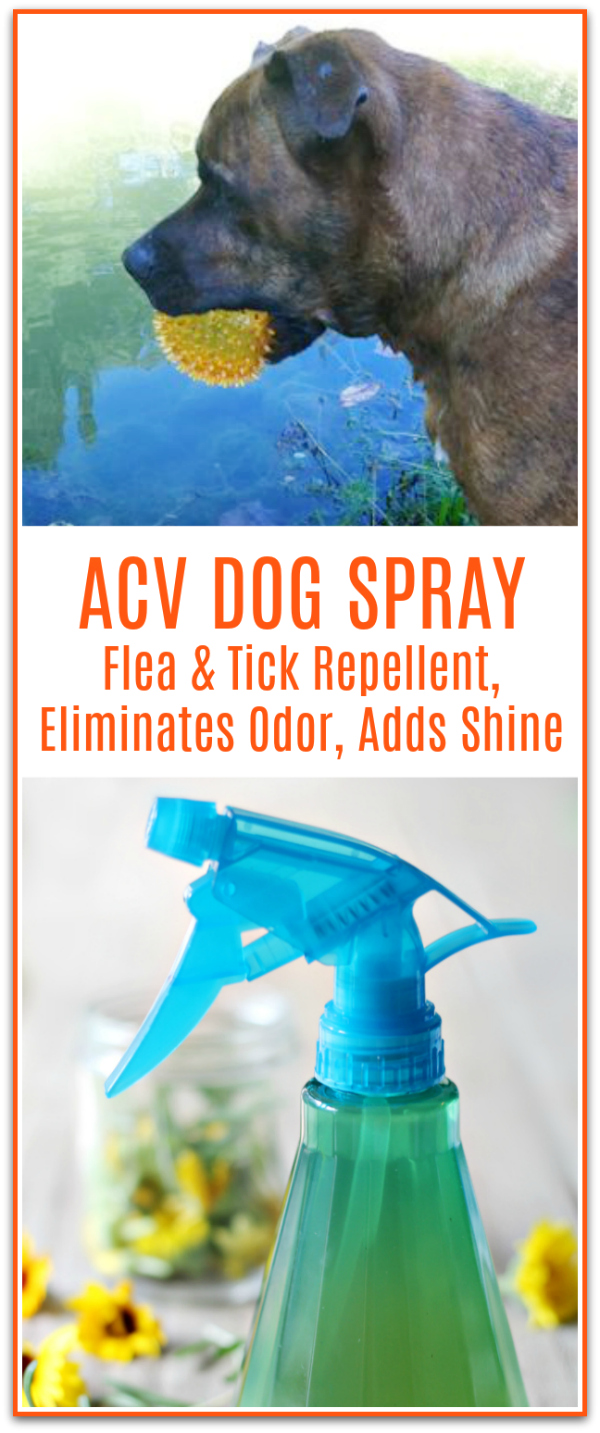
ACV Spray for Dogs: Repels Fleas, Removes Odor & Shines Coat
After using my Apple Cider Vinegar for Hair Repair Spray, I can’t get over how much apple cider vinegar and the specific hair herbs have strengthened and helped my hair…and oh the shine! It totally inspired me to create a custom Apple Cider Vinegar spray for my 10 year old dog, Bently.
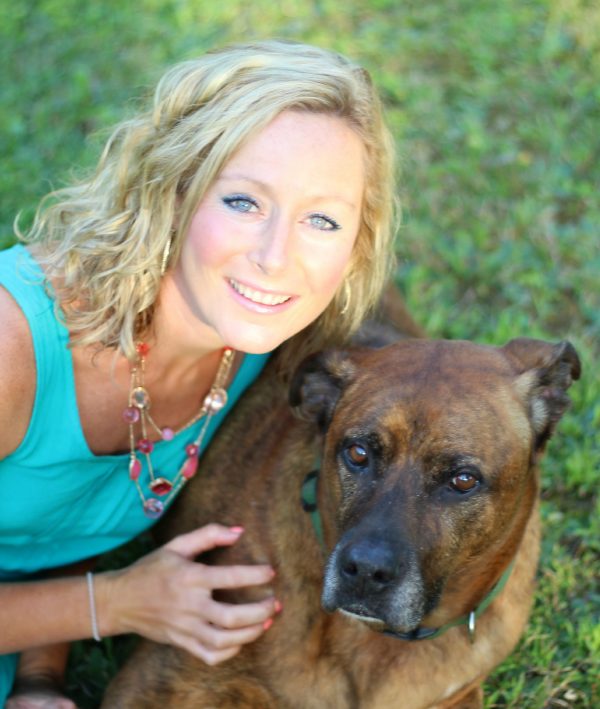
My goal was to mostly help his odor. Every summer, he starts to smell a bit and by midsummer, his odor is at its peak. Bently’s in our creek and pond water multiple times a day during the summer. He has a very thick coat so we’ve found it difficult to keep him dry. As most of us already know, wet, hot and humid conditions are the perfect breeding grounds for unwanted bacteria and fungus, which affect his skin and his odor.
And his odor is gone now! This ACV spray for dogs doesn’t mask the odor like many dog odor sprays do. It actually eliminates the odor by getting rid of the unwanted bacteria and fungus that were causing the smell in the first place.
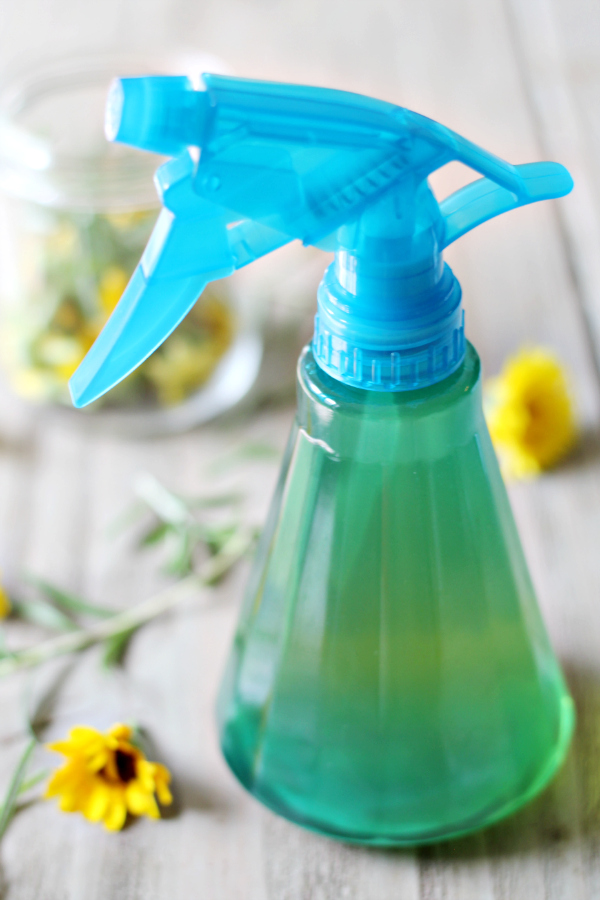
Not only has this spray eliminated his odor, but the ingredients repel fleas, ticks and flies, help itchy skin, control dandruff, detangles and adds SO much shine, gloss and softness to his coat. It’s a winner on all levels and I’m so excited to share it with you!
And don’t worry, your dog won’t smell of Apple Cider Vinegar – the smell dissipates as soon as the spray dries. But it’s very important to not apply this to open wounds or cuts. It will sting!
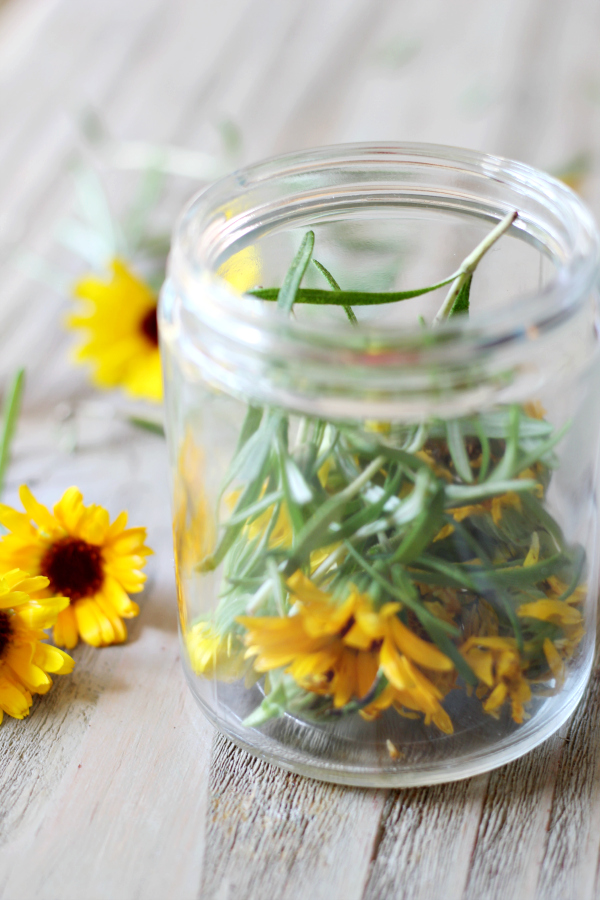
Apple Cider Vinegar for Dogs
Apple cider vinegar has been used for centuries and has many benefits for dogs. Most notably, it’s a natural flea and tick repellent!
More apple cider vinegar benefits for dogs:
- anti-bacterial and anti-microbial properties that can help alleviate fungal and bacterial infections, mites, mange, dandruff
- soothes inflammation and calms downs irritations
- relieves itchiness by balancing the skins pH levels
- combats fungal and yeast infections due to the acids in ACV
- adds shine and gloss to coat
- detangles
- eliminates odors naturally
- natural flea, tick and insect repellent
- holistic vet approved (but do not apply to open cuts, wounds and hot spots – it will sting!)
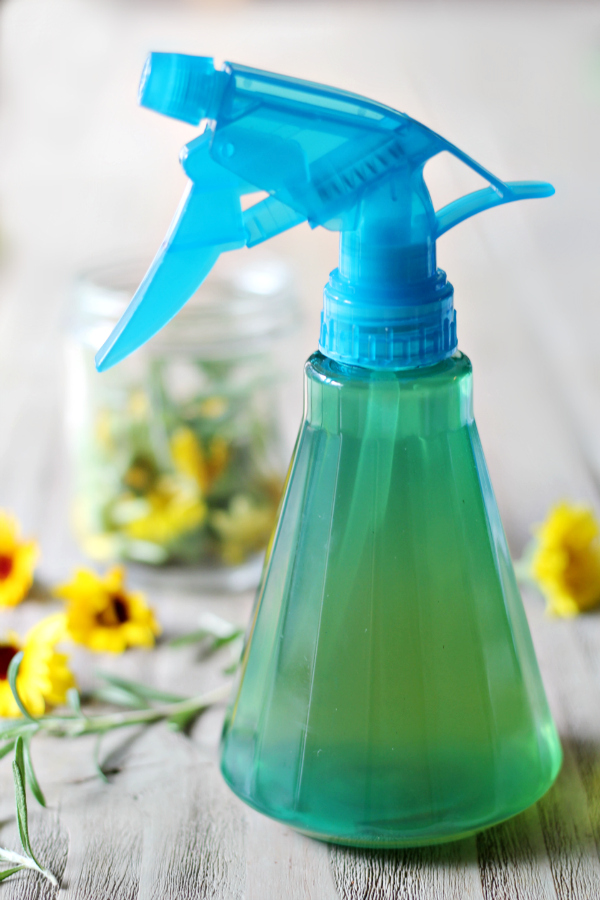
Apple cider vinegar is also a wonderful way to extract minerals and medicinal properties from the herbs we are using for this acv spray for dogs recipe. Adding extremely beneficial and dog-safe herbs to this recipe works double duty for our furry friends!
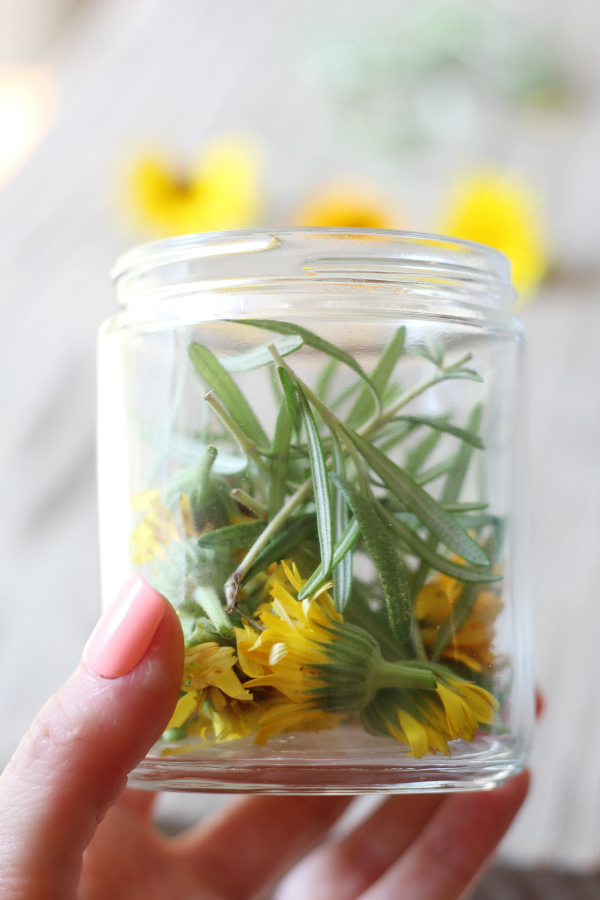
Rosemary for Dogs
Dr. Pitcairn’s Complete Guide to Natural Health for Dogs & Cats by Richard H. Pitcairn, DVM, shares that rosemary is wonderful for a glossy coat and as a flea repellant. It’s a natural way to prevent and repel ticks and fleas. Rosemary works best as a repellent and preventative, although it can help a light flea infestation. It also helps repel mosquitoes, flies and other insects. It’s a herb many find effective for mange because it stimulates the scalp and promotes hair growth. Moreover, rosemary adds shine, strengthens the coat, and conditions hair and skin.
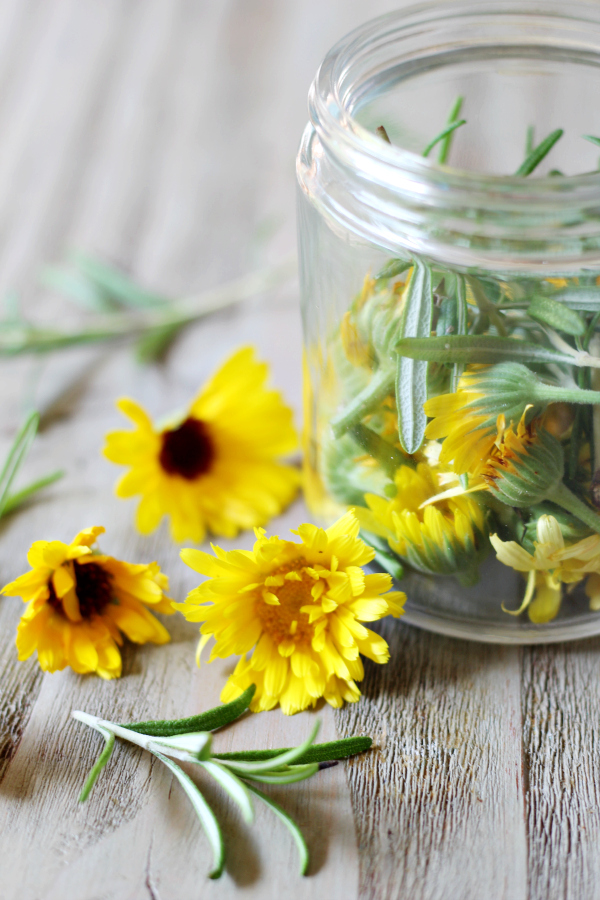
Calendula for Dogs
Calendula is one of the best and most well known herbs for soothing skin conditions. It’s a powerful anti-inflammatory and extremely healing to all skin issues. It’s also anti-fungal, anti-bacterial and anti-microbial and protects the hair and skin from bacteria, yeast and fungus growth. It adds shine, gloss and will condition and detangle the coat. Calendula is one of the gentlest and safest herbs and can be used for small puppies.
It’s important to not apply this to open wounds or cuts. It will sting!
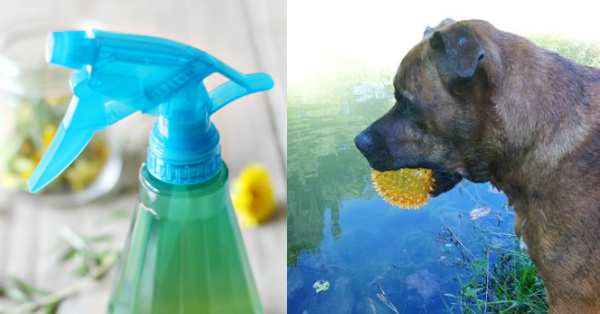
ACV Spray for Dogs Recipe:
- glass jar of choice (I like using THESE jars or mason jars)
- dried or fresh rosemary (Find HERE)
- dried or fresh calendula (Find HERE)
- raw apple cider vinegar (find HERE)
- water
- spray bottle (I got mine from Dollar Tree. HERE's a good glass option, too)
- Pack a clean glass jar ¾ of the way full with your dried herbs. If using fresh, make sure to air dry them for a few hours to take away some of the moisture content.
- Fill the jar with vinegar and cover with a plastic lid or line a metal lid with parchment or wax paper.
- Let sit for a minimum of 2 weeks up to 6 weeks.
- Strain and compost or discard the herbs and put the herbal vinegar in a clean jar. You just made an herbal acv vinegar concentrate that keeps for 1-2 years! Now we need to dilute it to use it for our spray.
- Combine 1 part vinegar to 2 parts water in a spray bottle. You can safely store your diluted vinegar spray for 1 month.
- After bathing, apply a generous amount of your spray to your dog's coat. Leave on coat and allow to dry. No vinegar scent will be present after your dog is dry. You can also use on dry fur whenever necessary.
- Since all dogs are different, the amount you should use this spray varies. In general, dogs with skin conditions or issues that you are trying to support will need to use this spray more often. Sometimes daily use is necessary until the issue is noticeably improved. Then, once or twice a week for maintenance. You'll have to experiment to find what works the best with your dog. I used this daily until the odor was eliminated and then twice a week for maintenance. In the fall and winter, I will cut back to once a week.
Let me know your success with this if you try it! I think you’ll love how shiny and soft it makes your furry friend! And your buddy will love not being bothered by fleas, ticks, flies and other insects! I know my ‘ol buddy boy is loving all the extra snuggles he’s getting because he doesn’t stink anymore 🙂

More DIY, Natural Dog Recipes & Articles:
Homemade Tick Spray – this is what we’ve used for my whole family (and dog!) for the last 6 years with success living on 16 acres of woods & in a tick “hotspot” area
Homemade Flea Powder – works for infestations and as a preventative
Natural Flea Control – article all about many different & effective natural flea control options
Homemade Grain Free Dog Treats – my picky dog loves these!
 Primally Inspired Real food, Natural Remedies, Holistic Living
Primally Inspired Real food, Natural Remedies, Holistic Living






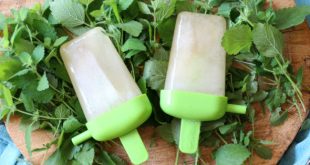
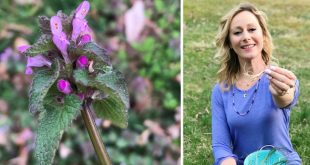

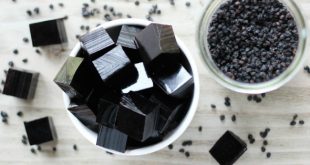
Thank you for this! So timely. I’m dog-sitting my sister’s lab and boy do we need this!
Awesome!
great recipes but having had a dog with epilepsy please don’t use rosemary in the spray (and watch out for it used in dog food as a natural preservative)
Hi Brit, Rosemary (the plant) is considered safe and non-toxic for dogs and cats. There seems to be some misinterpreted information out there about the actual plant/herb, rosemary. It’s rosemary essential oil (in large doses) that can be toxic to dogs and people. Rosemary essential oil contains highly concentrated extracts of plant constituents that are far beyond the normal concentrations found in nature. Dogs with a history of epilepsy shouldn’t use rosemary essential oil. The actual rosemary plant is considered safe and non-toxic and recommended by holistic vets (it’s also considered safe/non-toxic from regular vets, too) and has never been found to be an issue for animals in the recommended dosages.
Last yr i grow own herbs. Rosemary, basal mix in a jar, sits up over 3-4 days. I added fresh aloe vera. Mixed, shook well. I left herbs in..Dogs free sand fleas, fur from chewing grew back. Soft. They didnt fight spray. My diva pomeranian would raise head up. At 1st. Id ask what are you doing. I called it her skin care regimen.
This year, added oatmeal milk. Let oatmeal sit up..2 hours. Adding to mixture. Pomeranians have very dry skin thus fur.
Yes, both very happy.
So awesome, Sharon! Thanks for sharing!
Good to read!
Thank you! Trusting it will help your dog 🙂
Epilepsy is a disorder. I have it. Damage to rt temporal lobe.. i had a doxie had it. Lived 16 years. Treatment, CBD oil
.if going into seizure, under tongue..stops it immediately. Ive grown, aloe, rosemary, basal, mint. 2nd year..
Flea meds can cause seizures
.id. use baby benadryl
Oh dear. Really! My dog was just diagnosed with this! Thanks for posting!
We have a doxie mix that was rescued when she was a puppy. She had puppy mange. It was treated and she got her hair back until she had another round of it. Now many years later we still ate dealing with it but only when she stresses it seems. Will this work on her?
Also will this work on horses. My mare is allergic to the “no see um bugs” and breaks out in hives on her neck and itches her something fierce.
The recipe you are using is with either fresh or dried herbs. Would the essential oils of the herbs works just as well in this recipe?
Hi NanaBeth, yes, this is great for mange! And it’s also wonderful for horses.
Usually, essential oils would be a great substitute, but with this recipe, I do not recommend essential oils. Rosemary, the plant/herb, is a pet-safe and recommended herb for animals, but rosemary essential oil isn’t (it’s too strong for most animals, even when diluted). Rosemary is necessary for this recipe to work well, especially for mange. Hope that helps!
Thank you Kelly, I needed to make this for my border collie a month ago! We would both be happier 🙂
So I’ve just picked the rosemary and have it drying out.the calendula I was able to get at my local health food store is all dried flower petals. How much should I use for 16oz of ACV? Also do I use the stems of the rosemary or just the leaves?
Thank you, now we will just need patience to wait for it to process!
Hi Jeanne! You can use the whole rosemary plant – stems and leaves. For 16 ounces, 1 total cup of herbs will be plenty!
If you have any calendula left over and are wondering what to do with it, pour olive oil (or your favorite facial oil – almond oil, avocado oil, etc) over the calendula and let it sit for 4-6 weeks in a covered jar then strain the calendula out. It will make the BEST, most luxurious facial and body oil! 🙂